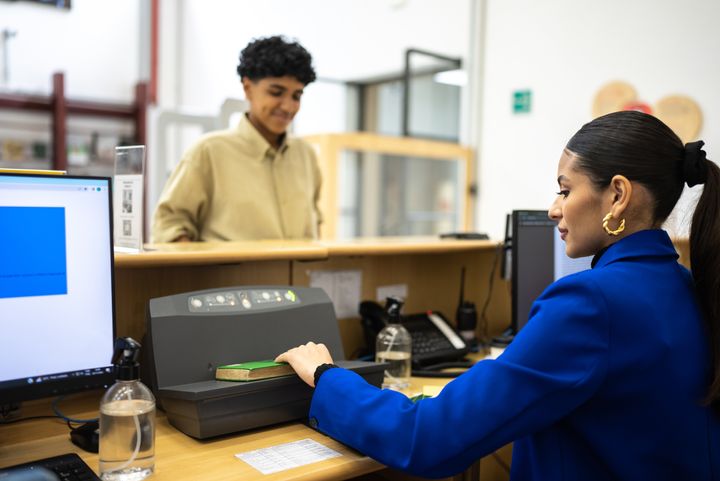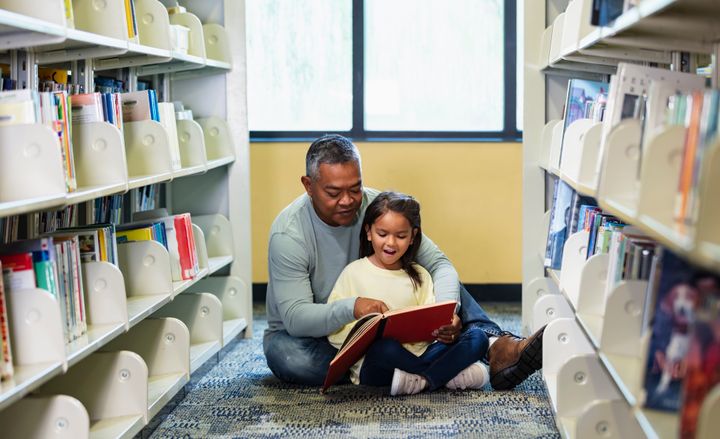Should I Feel Guilty For Checking Out A Book Instead Of Buying It?
If you check out a book from the library, are you hurting an author’s bottom line? Should you feel guilty if you’re a dedicated library-goer rather than a book purchaser?
Margery Bayne, a self-published author and librarian in Baltimore, has heard questions like these quite a few times through the years and thinks the answer is largely “no.”
Advertisement
“Sure, if you love a book you borrowed from the library and think you’re one day going to read it again, buy a copy!” she said. “But if you are low on funds, there are other ways to support an author besides purchasing the book.”
If you are a reader questioning the ethics of your personal checkout practices, it may help to know a little bit about how libraries work, she added.
Libraries keep track of how many times a book is checked out, Bayne told HuffPost: If a book is checked out a lot, it leads to more sales because the library considers those stats (a) when determining whether to buy replacement copies of a title when its copies get worn out or damaged, (b) if they need to buy more copies to fill community interest and demand, and (c) how many copies of the author’s next book they will buy, she explained.
Jane Friedman, a publishing industry reporter and author of “Publishing 101: A First-Time Author’s Guide,” agrees with Bayne: Your library checkout guilt is probably unwarranted.
Advertisement
“Libraries pay publishers for books, and publishers pay authors royalties on library sales just like bookstore sales,” she told HuffPost.
For book publishers and authors, library sales are simply another distribution channel, just like Amazon, your local bookstore or schools.
“Moreover, for digital books (e-books and audiobooks), libraries pay higher pricing than consumers and publishers put considerable restrictions on how libraries can lend that book,” Friedman said.
For most new releases, libraries can only lend an e-book 26 or 52 times before they have to purchase another license, often at a high cost ― $60-$80 is not uncommon, according to Friedman.

FG Trade via Getty Images
Advertisement
The one thing you should feel guilty for, Bayne said: pirating a book online.
“There is a big difference between one pirated copy online that is shared with potentially hundreds or thousands of people, versus the 9,000 library systems in the U.S. buying multiple copies of a book for a localized community to share,” she said.
Many authors ― lifelong users of libraries themselves, in many cases ― welcome library checkouts of their books.
“From the self-published author and indie publisher side of things, there is all sorts of advice and strategies out there about how to get your self-published books into libraries, because it is such a great marketing tool, and because they are such a big buyer of books,” Bayne said.
Of course, there are some authors who think libraries are part of the reason so many bookshops are closing down or that writers’ incomes take a hit because people are checking out rather than purchasing.
And publishing houses, who have much to gain from individual purchases, are considerably more conflicted about libraries, especially when it comes to e-books.
Advertisement
In 2019, Macmillan was drawn into a dispute with libraries nationwide over its decision to delay the release of new e-books for library lending in order to encourage sales within the first three months of a book’s release.
“We believe the very rapid increase in the reading of borrowed e-books decreases the perceived economic value of a book,” John Sargent, Macmillan’s then-chief executive, told librarians in a letter about the embargo. “I know that you pay us for these e-books, but to the reader, they are free.”
“Your patrons would be happy if they could get any book they wanted instantly and seamlessly, but that would be severely debilitating for authors, publishers, and retailers,” he said. “We are trying to find a middle ground.”
In response to backlash from libraries and readers, Macmillan ended up abandoning the embargo.
“What research has been done shows that libraries are one of the best unofficial marketing and promotion arms of book publishers.”
– Jane Friedman, a publishing industry reporter
Unfortunately, very little research has been done on the effect of library lending on book sales.
“What research has been done shows that libraries are one of the best unofficial marketing and promotion arms of book publishers,” Friedman said. “There are more public libraries in the U.S. than McDonald’s locations.”
Advertisement
Danielle Bayard Jackson, a friendship coach and podcast host, just released her first book, “Fighting for our Friendships: The Science and Art of Conflict and Connection in Women’s Relationships” earlier this month.
As a new author, she gets where writers pining for individual purchases are coming from; after all, you won’t nab a spot on the New York Times bestseller list if few people are buying your book.
But pound for pound, Jackson said, she’d prefer a library reader who will spend time with her book and then actively promote it to their friend circle over one who’ll purchase the book but stay quiet about that purchase.
For the first-time author, word-of-mouth marketing is just as meaningful as being on any bestseller list, especially in the long run.
“I’m looking for the type of reader who will go and have conversations about it, recommend it to friends, post about it and recommend it to their book club,” she told HuffPost. “If your best friend says, ‘Yeah, I read that book last week, it was so good,’ I don’t care if she got it from the library or if she bought it from Target.”
Advertisement
As a firm believer, Jackson recently called libraries around the country to make sure they had a copy of her book in stock.
Requesting a book at your library if it’s not in their system is actually a great way to support new authors if you’re not purchasing, according to Katherine D. Morgan, the owner of Grand Gesture Books, a romance bookstore located in Portland, Oregon.
“Libraries do have to buy those books, they’re not just getting those books for free,” she said.
As a bookseller, Morgan knows how expensive books are (a new hardback can set you back $30) and considers books a luxury. Given how cost-prohibitive collecting books can be, she’s thankful libraries exist.
Plus, she said, given how long the wait lists can be for both digital and hard copies of books, even dedicated library readers buy books every so often rather than wait 10 weeks for a popular book.
Advertisement
“As a bookstore owner, obviously, I’d love for someone to buy books,” she said. “But as long as you’re sharing about the book and someone else sees the book, and they’re like, ‘OK, I want to buy that book now,’ then that’s good enough for me.”
Ann H. Gabhart, the author of “The Song of Sourwood Mountain,” doesn’t believe libraries have harmed her sales. If anything, she said, they may have boosted her numbers by introducing her work to readers who might not have picked up one of my books otherwise.
“I want every library to have my books on their shelves,” she said. “I think my publishers would like that, too.”

kali9 via Getty Images
Gabhart recommends posting reviews on sites like Goodreads, BookBub or sites like Amazon.
“Reviews help new and up-and-coming writers get noticed, but also help a book by established authors get some necessary buzz,” she said.
Advertisement
Dee Garretson is an author of children’s and young adult fiction. As a lifelong library user, the most exciting part of having her first book published was the glee she felt seeing it in a library.
“I’m still excited when a friend sends me a picture of my book on a library shelf,” said the author, who also penned a number of the popular “Boxcar Children” chapter books.
Through the years, Garretson said she’s been lucky enough to benefit from libraries recommending her books to readers. Twice, she was selected by the Junior Library Guild, a collection development and book review service that thousands of schools and public libraries rely on to make purchases.
“That was a major boost to sales, because many libraries choose those selections to then purchase,” said Garretson.
Librarians, both public and school, have been her biggest supporters over the years: “They’ve posted online about my books, reviewed them, used them in displays, book-talked them, and encouraged readers to check them out,” she said.
Advertisement
“So my feeling is, if a reader likes one of my books, I hope they search out more, either to check out or to buy, but I never want my readers to feel guilty about library book reading,” Garretson said.

Comments are closed.